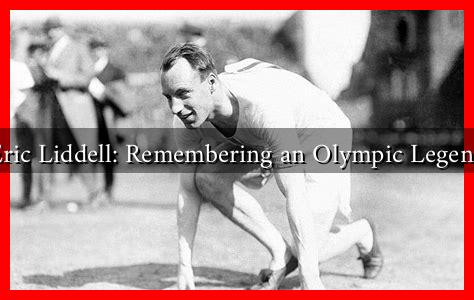-
Table of Contents
Eric Liddell: Remembering an Olympic Legend
Eric Liddell, a name synonymous with athletic excellence and unwavering principles, remains a beacon of inspiration long after his time. Born on January 16, 1902, in Tianjin, China, to Scottish missionary parents, Liddell’s life was a remarkable blend of faith, sportsmanship, and commitment to his beliefs. His legacy, particularly highlighted during the 1924 Paris Olympics, continues to resonate with athletes and non-athletes alike.
The Early Years: A Foundation of Faith and Athletics
Growing up in a missionary family, Liddell was instilled with strong Christian values from a young age. His family moved to Scotland when he was five, where he excelled in various sports, particularly athletics and rugby. Liddell attended the prestigious Edinburgh Academy, where he honed his athletic skills and developed a passion for running.
- Education: Liddell studied at the University of Edinburgh, where he balanced his academic pursuits with his athletic ambitions.
- Rugby Career: He played for the Edinburgh University rugby team, showcasing his versatility as an athlete.
Despite his growing fame as a runner, Liddell’s faith remained central to his identity.
. He famously stated, “I believe God made me for a purpose, but he also made me fast. And when I run, I feel His pleasure.” This quote encapsulates the duality of his life—his dedication to sport and his commitment to his faith.
The 1924 Paris Olympics: A Defining Moment
The 1924 Paris Olympics marked a pivotal moment in Liddell’s life and career. He was a favorite to win the 100 meters, but when he discovered that the heats were scheduled on a Sunday, he made the controversial decision to withdraw from the event. This choice was rooted in his deep Christian beliefs, which emphasized the sanctity of the Sabbath.
- 100 Meters: Liddell’s withdrawal shocked the sporting world, as many viewed it as a significant sacrifice.
- 400 Meters: Instead, he competed in the 400 meters, a race he had not originally planned to run. Liddell won the gold medal, setting a new Olympic record of 47.6 seconds.
His victory was not just a personal triumph; it was a powerful statement about integrity and faith. Liddell’s story was immortalized in the 1981 film “Chariots of Fire,” which highlighted his struggles and triumphs, further cementing his status as an Olympic legend.
Life Beyond Athletics: A Missionary’s Calling
After the Olympics, Liddell could have pursued a lucrative athletic career, but he chose a different path. In 1925, he returned to China as a missionary, dedicating his life to serving others. His commitment to his faith and his desire to help those in need were evident in his work.
- Missionary Work: Liddell worked in various capacities, including teaching and providing medical assistance.
- World War II: During the Japanese occupation of China, Liddell continued his work, even as conditions deteriorated.
Tragically, Liddell’s life was cut short when he died in a Japanese internment camp in 1945, just months before the end of World War II. His legacy, however, lives on through his unwavering faith and commitment to service.
Legacy and Impact: More Than Just an Athlete
Eric Liddell’s story transcends athletics; it is a testament to the power of conviction and integrity. His life serves as an inspiration for many, illustrating that true greatness lies not just in winning medals but in standing firm in one’s beliefs.
- Inspiration for Athletes: Liddell’s story encourages athletes to prioritize their values over fame and fortune.
- Educational Initiatives: Various organizations continue to promote Liddell’s legacy through educational programs and sports initiatives.
For those interested in learning more about Eric Liddell, resources such as the [Eric Liddell Centre](https://www.ericliddellcentre.org.uk/) provide insights into his life and ongoing impact.
Conclusion: A Lasting Legacy
Eric Liddell’s life is a powerful reminder of the importance of faith, integrity, and service. His decision to prioritize his beliefs over athletic glory during the 1924 Olympics has inspired countless individuals to stand firm in their convictions. As we remember this Olympic legend, we are reminded that true greatness is measured not just by achievements but by the values we uphold and the lives we touch.



